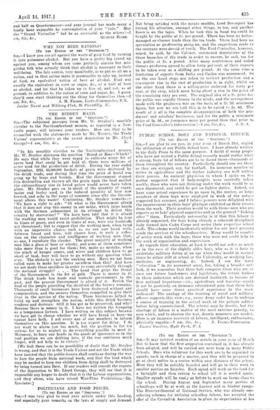THE HIDDEN HAND.
(To THE EDITOR OP THE " SPECUTOR."] Sm,—The subjoined passages from Mr. W. Straker's monthly circular to the Northumberland miners, as reported in a New- castle paper, will interest your readers. How are they to be reconciled with the statements made by Mr. Turner, the Trade Unions' representative at the recent deputation to Mr. Lloyd
" In his monthly circular to the Northumberland miners, Mr. W. Straker discusses the question Bread or Beer—Which?' He says that while they were urged to cultivate every bit of spare land that could be got hold of, there were millions of acres used for the production of drink. During the year ended September, 1916, 65,000,000 bushels of grain were destroyed by the drink trade, and during that time the price of bread was going up by leaps and bounds. Had the Government stopped this destruction and thrown all the grain upon the food market the extraordinary rise in bread prices would never have taken place. Mr. Straker goes on to speak of the quantity of sugar, maize and barley used in the reduced quantity of beer now brewed, and asks in the name of common sense why the Govern- ment allows this waste? Continuing, Mr. Straker remarks :- ` We have a right to ask : " Of what is the Government afraid that it does not stop this enemy in our midst, which joins hands with the German submarines in its attempt to defeat this country by starvation?" We have been told that it is afraid the working men would resist prohibition. That might be true in times of peace, and even in times of war, were our foodstuffs not threatened; but to suggest that the working men, when faced with an imperative choice, such as we are now faced with, between bread and beer, will choose beer, is such a reflec- tion on the character and intelligence of working men that, as one, I repudiate the slander. The great majority of working men like a glass of beer or whisky, and some of them sometimes take more than is good for them; but, make no mistake, when the pinch of hunger comes, and wives and children have to go short of food, beer will have to go without any question what- ever. The obstacle is not the working men. Have we not been called upon to make far greater sacrifices than this? And have we not made these sacrifices in order to come successfully through the national struggle?. • . The hand that grips the throat of the Government is the fist of gold. There is money in it. The drink trade has made and unmade governments in the past, and the present Government is afraid of it. Perish the food of the people providing tlte dividend of the brewer remains. Thousands of small businesses have been destroyed without any compensation, and the owners themselves compelled to give their lives in the service of the nation. These businesses helped to build up and strengthen the nation, while this drink business weakens and destroys. Still it has got to be preserved, and why? Because there is money in it. I have not written the foregoing as a temperance lecture. I have written on this subject because we have got to choose whether we will have bread or beer—we cannot have both. I ask every one of our members to inform themselves on this question. It is too urgent for delay. I do not want to alarm you to much, but the position is far too serious for us to neglect to do everything possible to meet it. Moreover, to bury our heads in the sands of ignorance as to the real position we are drifting into, if the war continues much longer, will not help us to victory.' " [We fear there can be no possibility of doubt that Mr. Straker is wrong, and that it is the Trade Unions and not the Trade which have insisted that the public-houses shall continue during the war to lure the people from national work, and that the food which may be needed to keep our children from dyingshall be destroyed by being turned into Beer. If our readers will consult the reports .of the deputation to Mr. Lloyd George, they will see that it is impossible any longer to doubt that it is the Labour organizations, and they alone, who has-e vetoed War-Time Probibitiea.—ED. Spectator.]


























 Previous page
Previous page